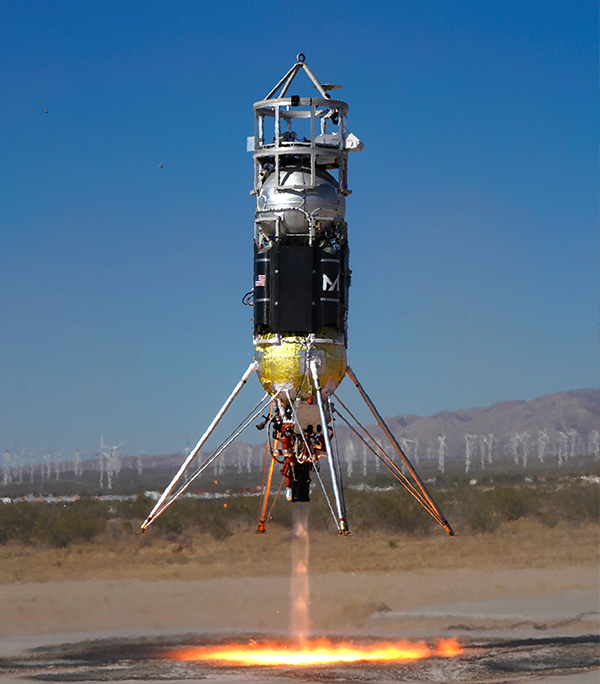
With the acquisition, Astrobotic adds a heritage of over 600 vertical test flights and landings, propulsion testing and development, and a portfolio of lunar technologies to its existing business.
Pittsburgh, PA, September 13, 2022 – Astrobotic announces today the acquisition of Masten Space Systems, a pioneering space technologies company with industry-unique suborbital payload testing services, which include a heritage of more than 600 vertical takeoff and landing (VTVL) rocket flights. The acquisition also includes Masten’s portfolio of advanced space technology development programs advanced over 18 years of operations.
Astrobotic and Masten’s combined workforce of more than 200 employees will continue operations in Pittsburgh, Pennsylvania and at the Mojave Air and Space Port in California. The combined company will maintain suborbital flight operations at Masten’s test sites at Mojave, with plans to continue offering the space industry a key testing site for hot fire rocket tests.
“Masten’s suborbital launch vehicles and propulsion test centers are national assets for the space industry. We are excited to operate and expand these services for companies, governments, and space agencies internationally,” said Astrobotic CEO John Thornton. “Bringing these services to Astrobotic is a natural fit for our mission to make space accessible to the world.”
Masten established itself as a leader in VTVL innovation in 2009 when it won first prize in the Northrop Grumman Lunar Lander XCHALLENGE. That win helped lay the foundation for Masten’s one-of-a-kind VTVL flight program, which has demonstrated industry-leading landing precision and rapid reusability over its 600+ VTVL flights to date. Since 2011, Masten has served NASA’s Flight Opportunities Program, providing flights to NASA-sponsored payloads to prepare them for spaceflight. Masten rockets have flown payloads for current and future lunar and interplanetary missions, including Astrobotic’s OPAL terrain relative navigation system, Honeybee Robotics’ PlanetVac system, and NASA’s Jet Propulsion Laboratory’s lander vision system for the Mars Curiosity mission.
At Astrobotic, the former Masten team will continue to offer and develop its unique test capabilities, including providing VTVL test flights for commercial and government customers. Astrobotic plans to expand these test flight offerings with the development of the next-generation Xogdor rocket, which will offer higher altitudes, longer missions, and supersonic flight for suborbital payload testing.
Beyond VTVL flights, Masten’s propulsion test stands will advance rocket technology for both external customers as well as Astrobotic departments. This testing infrastructure, which ranges from single element injector testing to 25,000 pound thrust rocket engine testing to landing simulation testing will provide a variety of hot fire solutions to support Astrobotic and its customers. Astrobotic will also continue to advance Masten’s space technology portfolio, which includes innovations in lunar night survival, instant landing pads construction, lunar water mining technology, and lunar infrastructure construction technologies. These new technologies are highly complementary to Astrobotic’s landers, rovers, and surface system product lines.
“I started Masten with the goal of tearing down barriers to space,” said David Masten, Masten’s founder and president. “On behalf of the Masten team, I am excited to join Astrobotic in our shared mission to make space accessible to the world. This combined organization will let us continue to provide important services to our customers and help us make a bigger impact on humanity’s future in space.”
“There is still more to iron out, but Astrobotic is confident in the value Masten’s team and capabilities add to Astrobotic’s already strong portfolio,” added Thornton.

